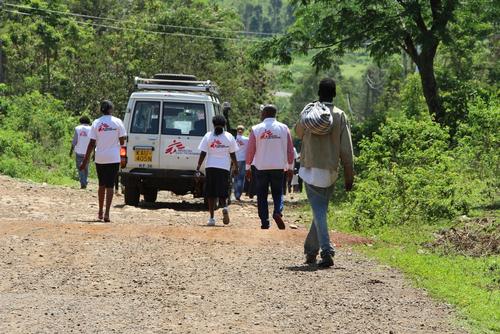Dr Isaac Masony, sub-county medical officer
“Today in Ndhiwa, HIV remains a major problem, with more 24 percent of our population infected with the virus. The most affected people are women aged between 15 and 25. In the past ten years or so we have been working with MSF, which has been taking care of HIV patients in Homa Bay district and now Ndhiwa district. A year ago a study was carried out by MSF and revealed the figures of the HIV in our district. We want to work on another approach to see if we can reverse the trend. This programme is a joint effort, shared from the beginning between the Ministry of Health and MSF.
There will be preventative and curative activities like the prevention of mother-to-child transmission (PMTCT). We also aim to develop voluntary medical male circumcision (VMMC), because it has been shown that, in areas where people are circumcised, there is lower transmission. Then we want to take care of patients who are already infected. We want to make sure that their viral load remains low and that there will be no transmission and no newly infected people.”
Justus Ocholla, district AIDS and sexually transmitted infections coordinator
“We still need to do a lot in this sub-county to improve the quality of care in decentralised health facilities and to support our staff. We are working with MSF on the Ndhiwa programme and the services are going to be improved, so that patients will have point-of-care assessment for their CD4 count and will receive antiretroviral (ARV) treatment as close as possible to their community.
Lots of people don’t know their HIV status, and the number of people who took an HIV test within the past three months is very low. So we want to reach people at the grassroots level to test them.
We need to reach people who are HIV-negative with preventive messages and make sure they remain negative. That’s the only way that we can reduce the incidence. We also need to know about the people who have been newly infected. For the people we have already identified as sick, we need to make sure that they can access quality HIV care, including prevention messages so that they don’t spread HIV to other people.
We intend to strengthen the health centres on the ground. They will organise teams to test people within their homes. The people who test positive will be referred to a health centre for HIV care services; this will help link the community up with the health centres. Even people who test negative may want to receive other health services – like family planning, or nutritional support. They will easily be able to access these services within the health centres close to them, rather than having to travel a long distance to reach the district hospital.
I would describe the relationship so far between the Ministry of Health and MSF’s Ndhiwa project with one single phrase – ‘perfect relationship’. And I only expect it to get better.”



